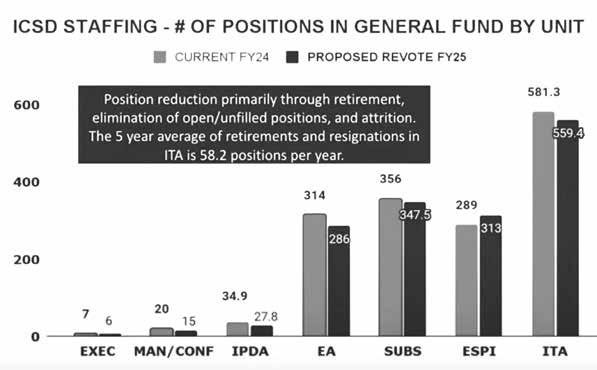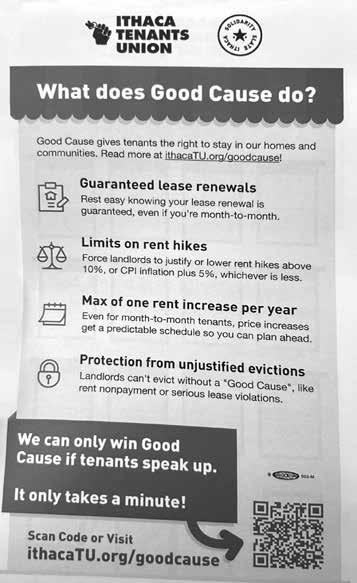PAGES 8-9

COUNCIL STOPS UNJUST FORECLOSURE PAGE 3 NEW ICSD BUDGET UNDER TAX CAP PAGE 4 HOUSING SURGE TRANSITIONS HOMELESS TO HOUSING PAGE 6 MY FAIR LADY OPENS AT CRT PAGE 11 ITHACA UNVEILS MURALS CELEBRATING CIVIL RIGHTS HISTORY PAGE 14


PAGES 8-9

COUNCIL STOPS UNJUST FORECLOSURE PAGE 3 NEW ICSD BUDGET UNDER TAX CAP PAGE 4 HOUSING SURGE TRANSITIONS HOMELESS TO HOUSING PAGE 6 MY FAIR LADY OPENS AT CRT PAGE 11 ITHACA UNVEILS MURALS CELEBRATING CIVIL RIGHTS HISTORY PAGE 14

“Fulfilling and mutually-beneficial.”
These words leap to Lauren and Alex LaBelle’s minds when recalling the feeling of co-presenting a financial literacy workshop for teens at The William George Agency for Children’s Services.
The workshop they developed was designed to help highschool-aged youth learn the basics of budgeting and smart s p e n d i n g s o t h a t y o u t h c o u l d m a n a g e t h e i r fi n a n c e s m o re effectively and confidently The course was presented over three sessions in January to twenty--seven youth.
When asked to cite one new thing they learned as a result of the training, participating teens responded:
“ The 50/30/20 Rule… 50% of your money toward needs, 30% toward wants, and 20% towards savings.”
“Budgeting tips and real world spending.”
“How much everything really costs.”
Before graduating this past month, the LaBelles were enrolled as MBA candidates in the SC Johnson College of Business, Park Fe l l o w s Le a d e r s h i p Pro g ra m a t Co
requisite community project, the married couple chose a project that would improve financial literacy among children. It was a topic dear to Lauren ever since she had lived in Louisiana, and one that held new meaning for the duo now that they had a toddler of their own.
“ While helping a colleague who was volunteering at a local middle school, I saw how little basic financial knowledge the students had through no fault of their own. ”
Lauren thought about the reasons for such a lack of financial knowledge. Poverty, as a major influence, couldn’t be ignored. Living paycheck to paycheck didn’t lend itself to long term planning, she surmised. How could kids be expected to know about basic budgeting if their parents didn’t know and teach them, she questioned Children were destined to follow the same generational curse unless they were taught a different way
“ That ’ s the moment I knew I wanted to do something to help break the cycle. When it came time to pick a theme for our project in business school, it was an easy decision,” says Lauren.
That, and the fact that only 57% of American adults are considered financially literate.
“ M a k i n g fi n a n c i a l l y r e s p o n s i b l e d e c i s i o n s i n v o l v e s understanding,” says Alex. “Understanding about the lure of impulse buying, the consequences of debt, predatory lending, the types of tools available to help build personal wealth, and the importance of self-discipline, management, and planning. People don’t automatically know these things. They learn it by studying finance or being taught by someone who has knowledge of the

subject or personal experience. Fortunately, like most things in life, financial literacy is a skill that can be developed. It ’ s never too late to learn and adjust behaviors to improve your financial security both in the present moment and for your future.”
“ We’re thankful to have the Cornell Park Leadership Fellows program so close to us, and grateful to the LaBelles for choosing to share their financial knowledge with youth on our campus,” says Helen Hulings, executive director at The William George Agency for Children’s Services. “ The feedback from the workshop has been encouraging, with more than a few participants indicating they would change their behavior to save more and be more careful with their money as a result of what they learned.”
The William George Agency has worked with Cornell Park Fellows in the past. Prior projects include a culinary arts and hospitality program that introduced teens to the hospitality and the restaurant industry and a business analytics project that enhanced The Agency’s reporting capabilities.
“Ours is a learning culture that aims to set youth up for success by adopting healthier attitudes and behaviors not just toward p e o p l e , b u t t o w a rd o t h e r i m p o rta n t a s p e c t s o f l i f e , s
c h
s finances,” says Hulings. “ The idea that it ’ s never too late to learn and to change is fundamental to our work. Through workshops like this, we hope the young people we serve come to appreciate learning as a lifelong opportunity that can improve their personal and financial freedom. Judging by workshop feedback, we’re off to a good start.”
T h e W i l l i a m G e o r g e A g e n c y f o r C h i l d r e n ’s S e r v i c e s i s committed to providing a safe and caring residential environment supported by proven, therapeutic, clinical and medical care for atr i s k y o u t h F o r m o r e i n f o r m a t i o n , v i s i t t h e i r w e b s i t e : www.wgaforchildren.org.
John Brazo, a 72-year-old lifelong Ithaca resident, faces the threat of losing his home due to an unpaid tax bill from 2022. However, recent action by the City of Ithaca Common Council offers a lifeline of hope for Brazo to remain in his home.
Last Wednesday, the Common Council unanimously approved a resolution that would allow Brazo to reclaim his home if he pays his delinquent taxes and associated fees by June 17. The resolution aims to provide relief for residents facing foreclosure due to missed tax payments.
Brazo, who has lived at 602 S. Albany Street for 66 years, fully paid off his property in 2022. An oversight led to an unpaid $842 tax bill, putting his home at risk of foreclosure. Despite paying his 2023 and 2024 taxes on time, Brazo only recently discovered the foreclosure proceedings through unopened letters.
Serenna McCloud, Brazo’s attorney, addressed the council, emphasizing the inadequacy of the city’s notification process. “I believe the city can go beyond the bare minimum,” McCloud said. “You would have to follow more robust notice procedures to
evict a tenant who doesn’t own a property. But the city can institute foreclosure proceedings, putting properties in jeopardy for something like 1% of their value.”
McCloud also criticized the city’s tax bills for not showing past-due balances. “The 2023 and 2024 tax bills do not show a ledger indicating a missed past due balance,” she said. “It almost looks deliberate, like a deliberate inflation of the amount due to the city.”
Henry Hansteen, another Ithaca resident, shared a similar experience. “In January 2022, I paid off a mortgage on a property, and for the first time in 30 years, I missed a tax payment,” Hansteen said. “This year, I received a letter stating I owed over $1,000 in fees and penalties, and foreclosure proceedings had begun. This was the only notice I received regarding the missed payment from 2022.”
Hansteen described the city's policy as “deceptive, fraudulent, and extortion,” urging the council to pass legislation requiring immediate notification of missed payments and including past due amounts on tax bills.
John Dennis, a Lansing resident and property owner in Ithaca, suggested delaying the foreclosure auction scheduled for June 24.
“As a property owner, I know the problems of

Last Wednesday, the Common Council unanimously approved a resolution that would allow Mr. Brazo to reclaim his home if he pays his unpaid taxes and associated fees by June 17. (Photo: Provided)
remembering to pay bills on time,” Dennis said. “Property owners need to be notified promptly to avoid situations like this.”
Ithaca resident Lilly Clinger expressed her concerns about the potential loss Brazo faces. “It’s unfair to let this man lose everything over a silly mistake,” Clinger said. “This man will have nowhere to go in the current housing crisis the city faces.”
Peter Salton, a Cayuga Heights Board of Trustees member, emphasized the need for policy changes. “The city has to wake up. You can’t deprive people of their property without due process of law,” Salton
Continued on Page 7
The Tompkins County Board of Elections has opened voting for its 2024 Voting Sticker Contest, inviting residents of all ages to participate in selecting the next "I Voted" and "Future Voter" stickers for the upcoming General Election.
The online voting platform is accessible at tcgov.co/2024sticker and will be open through Friday, July 5.
More than 100 young artists from Tompkins County submitted their designs for the contest. The "Future Voter" sticker competition included submissions from students in kindergarten through grade 5, while the "I Voted" sticker contest featured artwork from students in grades 6-12. The top 10 designs from each contest, selected by the Tompkins County Board of Elections, are now open for public voting. Community members can choose one design from each category.
To further engage the public, the Board of Elections will host a table outside their offices at 128 East Buffalo Street during the Ithaca Festival on Friday, May 31, from 11 a.m. to 5 p.m. The event will showcase the 2024 sticker designs, facilitate voter registrations, provide information on early voting hours for the General Election, and offer details on how to sign up as a paid poll worker.
Republican Elections Commissioner Alanna Congdon expressed her enthusiasm for the community's artistic talent and civic spirit. "We have such an amazing community of young artists in Tompkins County. Our Elections staff has been inspired by the designs we received and the interest in voting and civic engagement at a young age," Congdon said. "I encourage the whole community to look at the designs and select the ones that you feel best represent the spirit of civic engagement in Tompkins County.
ON THE
Ithaca Mayor Robert Cantelmo has said that Common Council will begin the process of opting-into Good Cause Eviction at their meeting on June 12, with a final vote expected to take place in July.
Remember, you can only get your sticker if you vote in the election this fall!"
Democratic Elections Commissioner Steve DeWitt highlighted the success of last year's contest and the importance of early engagement. "Last year, we were impressed by the community’s interest in this new tradition. It’s exciting to get young people involved and to get the word out about the General Election as early as we can," DeWitt stated. "I hope that community members will take the opportunity to visit our staff this Friday in front of our office during Ithaca Fest. We have tons of information, and we’re looking for poll workers for paid positions this November."
The Tompkins County Board of Elections aims to foster a culture of civic participation and ensure a well-informed electorate through these engaging community activities.
F r EE lan CE rs : Barbara Adams, G. M Burns, Jane Dieckmann, Charley Githler, Ross Haarstad, Steve Lawrence, Marjorie Olds, Henry Stark, and Arthur Whitman
THE ENTIRE CONTENTS OF THE ITHACA TIMES ARE COPYRIGHT © 2024, BY NEWSKI INC.
All rights reserved. Events are listed free of charge in TimesTable. All copy must be received by Friday at noon. The Ithaca Times is available free of charge from various locations around Ithaca. Additional copies may be purchased from the Ithaca Times offices for $1. SUBSCRIPTIONS: $89 one year. Include check or money order and mail to the Ithaca Times, PO Box 27, Ithaca, NY 14851. ADVERTISING: Deadlines are Monday 5 p.m. for display, Tuesday at noon for classified. Advertisers should check their ad on publication. The Ithaca Times will not be liable for failure to publish an ad, for typographical error, or errors in publication except to the extent of the cost of the space in which the actual error appeared in the first insertion. The publisher reserves the right to refuse advertising for any reason and to alter advertising copy or graphics deemed unacceptable for publication. The Ithaca Times is published weekly Wednesday mornings. Offices are located at 109 N. Cayuga Street, Ithaca, NY 14850 607-277-7000, FAX 607277-1012, MAILING ADDRESS is PO
(1972–1978) and The
27, Ithaca, NY 14851. The Ithaca Times was preceded by the Ithaca
QUESTION OF THE WEEK: WEDDING SEASON HAS ARRIVED. WHAT ADVICE DO YOU HAVE FOR NEWLYWEDS?

“Patience, respect, love.”
Rosa

“Don’t fight about the little things.” – Nomi

“Embrace the ‘seasons’ of your relationship. You and your partner will change over the course of time and those changes can make your relationship deeper and stronger.”
– Daniel

“Keep doing all the things you did before you were married, like holding hands and traveling together.”
– Kristin

“Doing small things for your partner makes a big impact.” – Alba
At the May 28 board meeting, the board discussed future options for the budget. Photo: Maddy Vogel
The Ithaca City School District has put forward a new budget for revote on June 18, featuring a tax levy increase of 2.79% from the 2023-24 budget’s levy. This budget is just under the state tax cap and therefore, unlike the May 21 budget, will not require a 60% supermajority to pass. If it doesn’t pass by at least 50%, the board will have to adopt a contingency budget.
After last week’s discussion of possible new budget options, the board of education held a special voting meeting on Monday, June 3 to adopt a new budget for revote on June 18, after their first budget failed to pass, with only 29% voter approval.
Although many were dissatisfied with the budget that voters saw on the ballot on May 21, the district’s first proposed budget was even higher, with a proposed 12.14% increase in the tax levy. This first budget was lowered after frustrated Ithacans filled Ithaca High School’s York Hall at the April 16 board meeting.
Now that the budget has been voted down, the board has decided to lower the levy for the third time, making the levy increase for this budget, at 2.79%, about a quarter of the initially proposed 12.14% levy increase.
The new budget with a 2.79% tax levy increase, features a $5.9 million reduction

in the tax levy from the May 21 budget. At the board's May 28 meeting, Deputy Superintendent Lily Talcott described the areas where reductions were made in this budget, and the implications of those reductions. Talcott said that they would not be going through a line-by-line breakdown of each item to avoid identifying specific personnel.
Key reductions include decreasing administrative labor costs by 22%, pausing the filling of vacant positions, establishing a 17 student minimum class size, pausing some equipment and supply purchases, reallocating teachers on special assignment back to classroom roles and creating professional development efforts focused on literacy, math and inclusion.

Talcott said that these reductions could lead to slower response time to staff, caregiver, board and community inquiries, potentially leading to a change in communication protocols. Reductions could also lead to having fewer people to support behavior management, likely increased suspension rates,
vacancies staying open longer and fill rates being negatively impacted and fewer opportunities for educators to make additional money outside of the school day.
In the current 2023-24 budget, the salaries for the district’s 7-person executive team makes up for $1,223,429, or 1.67%, of the total budget. With the proposed budget for revote, the team would make up $1,091,715, or 1.5%, of the total budget. This is a $131,714 reduction, likely the salary of one person on the team.
After questions were raised by Board Member Jill Tripp regarding possible cuts to teacher aide positions under the new budget, Talcott clarified at Monday’s meeting that there is a proposed increase to teachers aides, not a decrease.
The graphic that Talcott provided showing the expected numbers of positions this year versus next year shows a reduction of 21.9 Ithaca Teachers Association (ITA) positions. Talcott said these reductions do not reflect cuts, they reflect the anticipated resignations and retirements of staff.
This reduction shown is largely due to the district implementing a pause on filling vacant positions in their newest proposed budget.
“Any shifts in relationship to that are really going to be around electives and increasing class size,” Talcott said.
If voters don’t approve this budget, the district will have to adopt a contingency budget.
A contingency budget would mean that the district is only allowed to levy the
RE: Redeveloping the waterfront
“Please, oh please! Where am I, the Gulag? The proposed architectural rendering for this development is an esthetic disaster; a slap in the face of a most spectacular site. It totally lacks in originality, more fitting to a house of detention, cold and lifeless. Think of the incredible possibilities. Dream a little. Not the developer’s dream of how many people can I cram into a space, but a Hanging Garden of Babylon. Dream. Yes! Dream!” — Peter Schwartzott
“Hey Ithaca, why don’t you try building truly AFFORDABLE housing??? Shame on you for building housing for the rich. The least you could do with our tax $$$ is to build roads without potholes!” — John Balmer
“This is really really sad. I can’t imagine what the addition of 500 apartments will do to that area. The Waterfront Trail. The Farmer’s Market. These have a
certain character that 4 buildings with 500 new units and docks etc do not match at all. Especially as they are depicted in that drawing. I know things change. And there are too many critical things to address to prioritize fighting against this — but it’s very disappointing and sad.” — Lynne Jackier
“I always enjoy Brian Keeler’s essays but especially appreciate his retrospective of the work of Bill Benson. In Keeler’s last paragraph he wonders if the Johnson Art Museum might get around to mounting a Benson show. It took years before the Johnson gave Alison Mason Kingsberry [known locally as Mrs. Morris Bishop] a show and it took equally long for other very talented local people to be given a nod. A show of a deserving local artist would not be parochial. Such recognition of a recognized local artist would enrich us all and link together the art on the hill and that being created all around us.” —
Carol KammenRE: Should City Build a Public Restroom?
“The question about public restrooms is a tough question for me to answer. I can see the reason for "yes" and "no''. Who would maintain the public restrooms? How can we keep the junkies from using them to get high?” — Beauford Bennett

“Those favoring "good cause" eviction need to think beyond the immediate "feel good" aspects of the proposal, the real after effects. This will discourage private sector building of new housing in Ithaca. Good casue may exacerbate the affordable housing problem. Who will want to build a small rental project when they may have tenants who don’t pay rent or trash property when it could cost the owner thousands to evict someone? The more regulation NY adopts the more it risks having the people who pay the taxes move out to states with less regulation and lower taxes. Just look at CA which is bleeding people to TX and FL.” — Henry Kramer
“Laws like this make housing even less affordable. Fewer rentals means higher rents, assuming demand remains constant. Basic economics.” — Richard Ballantyne
“Who in their right mind would build rental housing in Ithaca? Meanwhile, new rental housing is sprouting up all over other parts of the country. Since problems caused by excessive leftism seem to mean only further leftism, expect to hear next that government built housing is needed in Ithaca. This despite the fact that "government housing project" is synonymous with disaster.” — Steven Baginski
“It will be interesting to see how this works out. Relocating people into Arthaus sure has been a Sh*t show. I don’t think Arthaus has any support. Time will tell.” — Sadie Benson
“An improvement, but still as "high as we can go" and stay under the cap. This seems to be the Board's guiding principle, treat the cap as a minimum, not a maximum and to assume that revenues from increases in assessments belong to the District, not the taxpayers. Class sizes may go up instead of finding operational efficiencies. to generate savings. Still too much on administration. What we don’t know: if electric buses are still to be funded, and what will be spent on "inclusion". All that said, the savings from going to contingency budget over the re-vote one are probably not worth voting down the re-vote budget. Voters should consider voting down any proposition that still includes electric buses. EV buses are not
mandated for years and can wait. Hopefully, the Board will have learned something this year, that there is a limit to what the public will tolerate in increases, even in Ithaca. Overreaches will be punished.” — Henry Kramer
“I’m voting the new prosed budget down. I saw an increase of 9% from 2022 to 2023. COVID was done with and much of the schools financial impact was funded by the State and the FEDS. The Ithaca City School District spent it all and implemented unjustified, continuous, ongoing projects. Now the "cash cow" has stopped and we’re just hearing that the school wants to return to student levels preCOVID. With this new proposed budget, my new 2024 increase will be 12.6%; not anything near the 2.8% that flashes out in the new recommendation. How can seniors on fixed income handle that increase. For us, that’s nearly a $900 increase over 2023. The new assessments are also causing a double hurt. Renters will see astronomical monthly increases as landlords pass their double digit increases onto the renters. Also, the concept of EV cars replacing diesel and gasoline engines is a dying fad. Way to expensive for a common folk to buy even with the government rebates. The bus replacement proposal is also a waste of money. Think of the infrastructure that has to be added just for 2 EV buses? Wow!! EV buses will be a thing of the past in a couple of years...” — David Wexler
“I find it ironic that the comments complaining about including funding for inclusion training are by people from privileged backgrounds who, of course, see no need to be inclusive as long as they get to benefit from their privilege.” — Tom
“‘Please see the "Vermont Electric & Transit Bus Pilot Program Report’ Compare findings for the bus companies in the report — Lion & Blue Bell. ‘Lion performed considerable better than Blue bell in the cold weather’ ‘Blue Bell lost as much as half their range before temperatures reached 32 degrees’ ‘At 0 degrees Lion lost 30–40 % Blue lost 80%’ ‘Blue Bell buses were inoperable for most of the 2 winters in which they were evaluated’. My question is why does the ICSD have a contract with Blue bell? Did the board see the Vermont Report? If not, why? One horrible thought. What if Trump wins the election in November — if he does we can kiss that $800,000. EPA money goodbye. There will be no $800,000 because there will be no EPA.” — Lee Rogers

On Saturday, June 8, Ithaca High School junior Joshua Kwakye-Minott secured first place in the Division I boys long jump at the New York State Public High School Athletic Association (NYSPHSAA) Outdoor Track and Field Championships. Kwakye-Minott achieved an impressive distance of 23 feet and 4.25 inches.

Downs
A routine traffic stop early Friday morning led to the arrest of two individuals on multiple drug and weapon charges, according to a statement from Tompkins County Sheriff Derek Osborne.

Heard
On Saturday, June 15, Southside Community Center will conduct a Juneteenth Festival from 12 noon to 6 pm in the street in front of the center at 305 South Plain Street. The festival will feature entertainment, information tables about community services, vendors, face painting for children and other activities.

Seen
The 15th Annual Peter De Mott Peace Trot 5k and 1-mile Fun Run organized by the Ithaca Catholic Workers is scheduled to take place on Sunday, June 16, 2024 at the Cass Park and Marina. Registration is from 7:30 a.m to 8:45 a.m and the trot begins at 9 a.m.
IF YOU CARE TO RESPOND to something in this column, or suggest your own praise or blame, write news@ithacatimes. com, with a subject head “U&D.”
Should the City build a public restroom?
62 7 % Yes.
28.4% No.
9.0 % I don’t care.

IVisit ithaca.com to submit your response.
By Matt Doughertyn a significant effort to address homelessness, the Human Services Coalition of Tompkins County, in collaboration with various community partners, has completed its first housing surge. This initiative was designed to quickly move individuals from homelessness into stable housing and culminated in the relocation of 39 households into permanent supportive housing units at the new Asteri Ithaca building on the Commons.
The news was announced by Human Services Coalition (HSC) Housing Specialist and Surge Coordinator Simone Gatson during a recent Continuum of Care (CoC) Homeless and Housing Task Force meeting on June 5. According to Gatson, “This effort was part of the Home Together: Tompkins plan to end unsheltered homelessness that was published by the CoC in 2023 and accepted by the City of Ithaca later that same year.”
The housing surge is a model that prioritizes rapid placement into housing with integrated support services and involves a coordinated effort among numerous local organizations, landlords, and service providers.
Asteri Ithaca, a new development in the heart of the city, includes 181 units of low-cost housing, of which 40 are subsidized through the Empire State Supportive Housing Initiative (ESSHI). These 40 units are designated for individuals experiencing chronic homelessness, providing them with both housing and supportive services.
“Coordinating the move-in of 39 households to Asteri Ithaca was a monumental task that required meticulous planning and collaboration,” said Gatson. “We engaged with 17 different service providers to ensure that we were able to meet the needs of every

individual and family moving in.”
The success of the housing surge was made possible by the extensive involvement of community partners who provided critical support throughout the process. “We had outreach workers, support service staff, and property managers all working together to make this happen,” Gatson explained. “The level of cooperation and dedication from everyone involved was truly inspiring.”
Key partners included TC Action and the Vecino Group, the developers of Asteri Ithaca. TC Action staff were on-site during the move-in process, helping residents settle into their new homes and ensuring they had access to necessary services. “We had three coordinators and a supportive housing program manager from TC Action on-site,” Gatson noted. “They were instrumental in making sure that residents had everything they needed as they transitioned into their new apartments.”
The Vecino Group also played a crucial role, demonstrating flexibility and commitment to the project’s success. “They came to various locations, including shelters and community centers, to complete lease applications and meet with prospective tenants,” Gatson said. “Their willingness to meet people where they were made a huge difference.”
Despite the overall success, the housing surge faced challenges, including lastminute logistical issues and the emotional stress of moving. “We had some hurdles, like coordinating transportation and ensuring everyone had what they needed for the move,” Gatson shared. “But thanks to the dedication of our partners, we were able to overcome these challenges.”
According to Gaston, one of the individuals slated to move into Asteri Ithaca passed away over the weekend before the move-in day. “We lost one household over the weekend, which was tragic,” Gatson said. “It’s a reminder of the urgency and importance of our work.”
The immediate impact of the housing surge is evident in the lives of the 39 households that now have a place to call home. However, the long-term benefits of such initiatives extend beyond providing shelter. “This isn’t just about housing…It’s about providing stability, support, and the opportunity for individuals to rebuild their lives,” Gatson said.
The supportive services integrated into the housing at Asteri Ithaca are designed to help residents maintain their housing and improve their overall well-being. “Each

resident has access to case managers, mental health services, substance use counseling, and other critical supports,” Gatson explained. “This holistic approach is key to ensuring they can stay housed and thrive.”
The success of the housing surge has set a precedent for future efforts to address homelessness in Ithaca. The city and its partners are already exploring ways to replicate and expand this model. “We’ve learned a lot from this experience,” Gatson said. “Our goal is to take these lessons and apply them to future initiatives so we can continue to reduce homelessness and support our community members.”
One of the key takeaways is the importance of collaboration and community involvement. “We couldn’t have done this without the support of our community partners,” Gatson emphasized. “From outreach workers to landlords, everyone played a vital role in making this possible.”
The Continuum of Care is also developing targeted prevention strategies to address the root causes of homelessness. “While the housing surge addresses the immediate need for housing, we also need to focus on prevention to reduce the number of people entering homelessness in the first place,” Gatson said. “We’re working on strategies to close the front door to homelessness, so to speak.”
Community members and organizations are encouraged to get involved in these efforts. “There are many ways to support our work, from volunteering to advocating for more affordable housing,” Gatson said. “We welcome anyone who wants to be part of the solution.”
The Continuum of Care is particularly
When I met with Shane Eversfield, he had just completed Fly By Night Duathlon, held at the Watkins Glen Speedway the night before. A duathlon? “This one is a run-bikerun-bike-run. Our transition area is the pit area. It’s a unique event that has been going on since 2006 and is now regarded as a true classic.”
Shane describes racing the hilly, twisting car racecourse on his bike in cold, windy, rainy weather. “Despite the weather, it’s a blast to race such a technical course on my bike, without cars. Today, I actually feel more fatigue from such intense shivering after I finished than I do from my effort at the race. But it was worth it for the thrill.”
Raised with three siblings in Maryland by a supportive, upbeat, and single mother, Shane headed to UMBC for his college study. Tall and wiry, he “arrived at college with an open mind — at first majoring in confusion: After a year, I realized that my greatest opportunity within the university community was to learn how to learn — to explore and develop my unique learning processes. Well, I learn best through action, rather than reading, so I decided to study Modern Dance — a study of movement, of action.”
“Modern is different from Classical Ballet in one profound way: Ballet has a fixed vocabulary of movements, each “tagged” with a name. Modern Dance has no such connection to words, no structure or finite vocabulary of movements. At first, the challenge was to develop my skills at problem-solving through movement and sense-felt experience — becom-


ing articulate and versatile at moving my body with grace, precision, and efficiency.
But the deeper challenge with Modern? As I watch someone move/dance across the floor, how do I record and then recall that movement… Somehow recording it in my body-brain, without using words? To do this, I have to task the neurons of both my brain and my body. I am thinking with my body. That is Mindful Movement. I also began to explore and practice T’ai Chi — on my own, without instruction or guidance. And I took up running for meditation as well.”
“Mindful movement is the practice of connecting our body with our mind. T’ai Chi is regarded as one of the oldest and most effective forms of mindful move ment. The purpose of mindfulness is to step outside of our thoughts and feelings so that we are able to use our mind and our experience effectively as a tool. Our mind is no longer on auto-pilot. It is a powerful observational tool. We are not the experience that is arising; we are the vessel that holds and creates the experience.”
Just how powerful is the practice of mindful movement? “In the mid-1980’s, on a whim, I purchased a book about Taoism, drawn to the book’s cover art. A third of the way through the book, I had a startling realization: Everything in this book… it was intrinsic to me. I already knew everything I was reading! ‘How is this possible? I am Taoist, even though I have never been exposed to Taoism. The way in which I perceive and interact with the universe is Taoist. How did this happen?’ It happened through my daily exploration and practice of T’ai Chi — without any formal instruction. It’s as if the movements had profoundly rewired my brain. This is the moment when I realized just how powerful mindful movement is to affect change in our mental function. This practice of mindful movement has permeated so much of my life: As a dancer, sculptor, forester, fire fighter, coffee farmer, triathlete, ultra runner, musician, fitness instructor… and now as a swim coach.”
In 2004, Terry Laughlin, Founder of Total Immersion Swim (TI), reached out to me after reading my first book, “Zendurance, A Spiritual Fitness Guide
My daughters and I moved here from the South. Being from the south, I’ve always heard of the superior North, and Ithaca is known to be one of the most liberal places in the US. My daughters are half black, which has never been an issue until we moved here.
Within the first month, we received a letter on “how to talk to your white children about BLM”. We were like, “huh, a little presumptuous, but at least they’re trying? “. Next, my second oldest daughter was called lazy by her teacher in front of her entire home room class.
My second daughter is my most “traditionally” looking mixed child. She was also identified gifted in Virginia and is one of those rare children who wants to be high achieving, and is willing to work for it. She is the farthest thing from lazy and I let that teacher know it. She has gone on to be extremely academically successful; in top classes and scores in the
continued from page 3
said. “It’s unfortunate that Brazo had to go through this, and the city needs to enact procedures and policies that prevent a minor bill from becoming a real problem for someone.”
The resolution approved by the Common Council addresses these concerns. It authorizes city staff to reconvey title to this year’s foreclosure properties to the former owners, provided they pay all outstanding taxes, penalties, interest, and other charges by June 17. If payments are not made by this deadline, the properties
continued from page 6
interested in working with landlords willing to participate in future housing surges.
“Landlord participation is crucial,” Gatson explained. “We need more landlords willing to rent to individuals experiencing homelessness and who can work with us
high 90s on every regent exam. However, she says the first quarter with new teachers are still tough because they “speak to me like I’m an idiot”.
My darker children have been invited to all black clubs based solely on how they look. (Mommy, they are putting all the black kids on a bus and bringing them to a park). My children have been called the N word at school in front of teachers who do nothing because “discipline at school unfairly targets black students”. My two children with blond hair and blue eyes have not encountered these issues, even though they all share the same parentage.
In light of the recent ICSD news, I hope they don’t double down on their current “no discipline and no differentiation” policies. Instead, we should try to treat all children equally. Set high standards for academics and behavior for all students in our school district, regardless of race. Lowering standards under the guise of racial equality is inherently racist. Do better Ithaca.
will be disposed of by public auction on June 24.
This resolution impacts Brazo and sets a precedent for handling future cases where minor tax delinquencies could result in severe consequences for homeowners. By ensuring more robust notification procedures and transparency in tax billing, the council aims to protect residents from losing their homes due to minor oversights.
The council's decision marks a significant step towards addressing the systemic issues within Ithaca’s tax foreclosure process. By adopting more stringent notification and billing procedures, the city aims to prevent future cases of inadvertent tax delinquency from escalating to foreclosure.
to provide stable, supportive housing.”
The completion of Ithaca’s first housing surge marks a significant milestone in the city’s efforts to combat homelessness. Through intensive coordination, community partnerships, and a focus on supportive services, the city has provided a pathway to
As the housing crisis continues to take its toll on Ithaca, Mayor Robert Cantelmo has expressed optimism about the potential impact of the Good Cause Eviction law passed in the New York state budget in April. After Albany became the first upstate city to optin to the law on June 3, Ithaca is beginning the opt-in process this week and could officially vote to opt-in by July 10 — becoming the second upstate city to codify increased tenant protections into law.
The law is designed to prevent arbitrary evictions and ensure housing stability for tenants by requiring landlords to provide a legitimate reason — or “good cause” — for evicting tenants. It also sets limits on how much landlords can increase rent.
Currently, in every municipality in New York State outside of New York City and Al-

The law is designed to prevent arbitrary evictions by requiring that landlords provide a legitimate reason — or “good cause” — for evicting a tenant.
(Photo: Stella Frank)

In regards to the “LLC Loophole” included in the law passed in the budget, Mayor Robert Cantelmo has said that he is strongly in favor of keeping the portfolio size as low as possible in Ithaca to ensure the law has the desired effect.
(Photo: File)
bany, most landlords can decide not to renew a lease for any reason. They also can increase rents without any limit, which results in some landlords increasing rent by as much as 60% in a given year. For example, a Zillow listing for a one-bedroom unit just outside the City of Ithaca had its rent increase from $1,300 in August 2023 to $2,100 by June 2024. That’s a 61.5% rent increase in just one year.
According to Housing Justice for All, the law included in the budget provides tenants protection against evictions for no reason, guaranteed lease renewals/ability to stay in your home month to month without a lease, ability to challenge rent hikes that are more than 10% or the Consumer Price Index (CPI) + 5%, whichever is lower, and mandates that landlords can only increase rent once a year.
Landlords have opposed Good Cause Eviction laws for years, insisting that the law would make it more challenging to non-renew or evict tenants who aren’t paying rent, are destructive to the property, or are harassing others on the property. Additionally, they say the laws would result in a

Ithaca Tenants Union member Genevieve Rand says the version of Good Cause passed by the State is the “weakest in the country,” emphasizing the need for Ithaca to opt into the law with stronger tenant protections than the ones outlined in the version of the law that was included in the budget. (Photo: File)
more constricted housing supply and make it harder for landlords to increase rents at a rate that would allow them to stay profitable, which could result in some landlords raising rent more often than they otherwise would.
In response to landlords’ concerns, advocates of the law have clarified that landlords will still have the ability to increase rent in a regulated way and to non-renew or evict tenants who have violated the terms of the lease. That could include nonpayment of rent, destruction of property, or having a pet in a unit when the lease states there is a no-pet policy.
original version of the law and the version that was passed in the budget.
Due to the differences between the original version of the law and the version included in the budget, tenant advocates have raised concerns about the legislation’s ability to protect renters effectively. Rand provided detailed insights into the law’s shortcomings and the steps local governments must take to enhance tenant protections when opting into the law.
Rand explained that the version of the law included in the budget is significantly weaker than the original proposal. “The bill that passed is the weakest good cause law in the United States of America,” she stated, emphasizing the law’s numerous exemptions. One of the most contentious issues is the law’s opt-in model. Unlike the original proposal, which sought universal protection for over four million tenants, the current law only automatically applies to New York City and allows upstate municipalities to decide whether to adopt the provisions. “It doesn’t cover most of the state. It’s opt-in, which is not what the original was,” Rand said. This change means that more than three million tenants who would have been covered under the original bill are now excluded.
“The new version introduced a portfolio exemption, stating that if a landlord owns fewer than ten units overall, none of their tenants are entitled to Good Cause protections.”
— Genevieve Rand
In a set of recent interviews with the Ithaca Times, Mayor Cantelmo outlined the city’s approach to opting into the law and its potential implications, while Ithaca Tenants Union (ITU) member Genevieve Rand outlined the differences between the
A particularly problematic aspect of the new law is the introduction of the LLC (Limited Liability Company) loophole. While the original bill included a small landlord exemption for owner-occupied buildings with fewer than four units, the final version expanded this exemption. “The new version introduced a portfolio exemption, stating that if a landlord owns fewer than ten units overall, none of their tenants are entitled to Good Cause protections,” Rand explained. This exemption is difficult to enforce because tenants often have no way of knowing the total number of units their landlord owns or the structure of their LLCs.
“This loophole is functionally unenforceable,” Rand noted. “Nobody knows how many units their landlord owns, and if their landlord is an LLC, nobody knows what other LLCs that LLC is connected to or what the corporate shield structure is. There’s no publicly accessible database to discover that.” As a result, landlords can easily claim the exemption without tenants having any recourse to verify the truth.
Additionally, the law includes a 30-year moratorium for buildings constructed after 2009, exempting them from Good Cause protections. Rand highlighted the adverse impact of this exemption, especially on newer developments. “Buildings built after 2009 have a rolling 30-year exemption,” she said. “If the building was built in 2010, then that building is exempt from good cause until 2040.” This provision undermines the law’s intent by excluding a significant portion of the housing market from its protections.
Rand also pointed out that municipalities have limited power to modify these exemptions. While they can address the portfolio exemption and set the fair market rent threshold, they cannot change the 30-year exemption for new buildings. “Municipalities only have control over two things: the portfolio size exemption and the fair market rent exemption,” Rand stated.
To opt into the Good Cause Eviction law, cities must pass an ordinance specifying their chosen provisions. “The city council must introduce and pass the ordinance, specifying customizable elements such as the portfolio exemption and fair market rent percentage,” Rand explained. In Ithaca, advocates are pushing for the city to adopt an ordinance that eliminates the LLC loophole and sets a fair market rent threshold that provides robust tenant protections.

loophole.” The legislative process in Ithaca is already underway, with a legislative memo expected to be submitted at the June 12 Common Council meeting.
Despite the challenges posed by the state law, Rand and the ITU remain dedicated to fighting for stronger tenant protections at the local level. “It is imperative that policymakers prioritize the needs of tenants and enact legislation that upholds their rights and dignity,” Rand emphasized.
“I am strongly in favor of keeping that portfolio size as low as practicable to ensure that it has the maximal benefits for the intended legislative effect.” — Mayor Robert Cantelmo
As Ithaca prepares to become the second upstate city to opt-in to Good Cause Eviction, Mayor Robert Cantelmo discussed the city’s approach to this significant legislative change and its potential impacts during a recent interview.
“I circulated the language internally here at City Hall, and we have staff reviewing the provisions of the budget and looking at other municipalities who have opted in,” he explained. “We are working on bringing an update to the council once staff have their arms around it.”
Once the review is complete, the process will involve bringing the findings to the Common Council for discussion and deliberation. This includes preparing a legislative memo and briefing for the council, followed by a public hearing, a committee vote, and finally, a full council vote.
Cantelmo is expected to introduce a legislative memo on June 12, with a formal vote by the Common Council potentially taking place by July 10. According to Rand, the version of the law anticipated to be introduced in Ithaca will closely mirror Albany’s, providing even more tenant protections than the initial version of the law passed by the state.
One of the critical aspects of the Good Cause Eviction law is determining how many housing units it will apply to in Ithaca. The law does not cover every housing unit, particularly those in newer constructions or those with rents above certain thresholds.
Mayor Cantelmo acknowledged that the law might not apply to every housing unit in the city. For example, units in buildings constructed after 2009 are subject to a 30year moratorium on the law’s applicability. Additionally, there are exemptions based on fair market rent thresholds. According to the law, protections apply to tenants who pay less than 245% of Fair Market Rent, which equates to about $2,761/month for a one-bedroom in Ithaca.
“I think it’s reasonable to anticipate that newer constructions may not be covered under the law due to certain criteria, such as fair market rent thresholds,” Cantelmo noted. “While the law won’t apply to every single housing unit, it remains an important tool in stabilizing our housing market.”
There have been concerns about loopholes in the law, such as exemptions for landlords with fewer than 11 units. Mayor Cantelmo emphasized the importance of keeping the portfolio size for exemptions as low as possible to ensure maximum benefits for tenants. “I am strongly in favor of keeping that portfolio size as low as practicable to ensure that it has the maximal benefits for the intended legislative effect,” he stated.
Rand remains hopeful that local efforts can mitigate the law’s shortcomings. She pointed to cities like Albany, which have successfully introduced stronger versions of the law without the LLC loophole. “Albany [recently passed] a version that brings the portfolio exemption number down to one, so functionally, all buildings are covered,” Rand noted. This approach ensures that almost all tenants in these cities will be protected, regardless of their landlord’s portfolio size.
Rand expects a similar commitment from the city council in Ithaca. “We have a more tenant-friendly council than many other places,” she said. “I expect the tenants on the council to support not adding that
Cantelmo highlighted the severity of the housing crisis in Ithaca, noting that the city is the second most expensive rental market among small cities in New York. He said this has put immense pressure on working families, young professionals, and retirees and that he was glad to see a version of the law included in the final budget.
“I was very heartened to see that some measure was included in the state budget to help address this issue,” Cantelmo said. “I, along with several of my colleagues, have been vocal supporters of including some form of statewide good cause in the budget.”
According to Mayor Cantelmo, opting into the Good Cause Eviction law requires a detailed procedural approach. The first step involves city staff reviewing the budget provisions and examining how other municipalities have implemented or are preparing to opt into the law.
Cantelmo has said that opting into the law isn’t a “silver bullet” for fixing the housing crisis but that it will take some pressure off Ithaca’s housing market, as 75% of Ithaca’s population consists of tenants.
Mayor Cantelmo underscored the need for a balanced approach to housing policy. While the Good Cause Eviction law is a significant step, it must be paired with broader initiatives to increase the supply of affordable housing in Ithaca. “As I’ve long said, we really need an all-of-the-above approach to housing,” he emphasized. “We need to be proactive about making Ithaca a community where people of all income levels can live and thrive.”

This column can be labeled as, I suppose, a tale of “bookends.” While some local athletes are on the front end of working hard to chase their dreams and their passion, a local coach is calling it a career after nearly four decades.
First up, Liam Reynolds, who just finished his Master's Degree (in Sports Management) and his pitching career at Niagara University, is about to become the latest of about two dozen players that former Wells College head coach Ryan Stevens has signed with the Alpine Cowboys, an Independent team based in Texas and playing in the Pecos League.
After graduating from Trumansburg in 2019, Reynolds suited up for Niagara County Community College, then transferred to Niagara University, where he helped to lead the team to its best season in program history, going 38-17 overall and 20-4 in the conference to win its firstever MAAC championship. Liam then
took the mound at Oklahoma State University at the NCAA Division 1 Regionals. From there, it has been a whirlwind, as Liam has been hustling to pull everything together and make the trip to Texas.
Liam called me from a stop along the way, and he said, “I worked with Ryan Stevens (who also coached the Alpine Cowboys) in summer ball during high school, and he has helped a lot of guys from this area learn to play baseball at a much more competitive level.” I asked Liam if he had been to Texas to get to know the situation before heading that way, and he said, “No, I don't know anyone. I'm excited to get to know the players and the coaches and see where things go. I want to be ready to play wherever they need me and enjoy the moment.”
People love a good underdog story, and when a Division III football player signs an NFL contract, people cheer for that athlete to make the roster and make an impact. When NFL camps open this summer, Ithaca College fans will keep a close eye on Derek Slywka, hoping to see him


wearing an Indianapolis Colts uniform when the season begins.
After a stellar career as a Bomber, Slywka popped up on the radar of both of this year's Super Bowl teams. He was invited to the rookie mini-camps of both the San Francisco 49ers and the Kansas City Chiefs, and his performance at those camps drew the attention of the Colts, who signed him, giving him that coveted opportunity to compete for a roster spot as a wide receiver.
It is no surprise that Slywka's numbers (as an All-American defensive back, ironically) put him on the NFL's radar. Over the course of his Bomber career, he had 119 tackles, 11 interceptions, 30 passes defended, and four blocks. His senior season stats (51 tackles, 6 picks, 16 passes defended, and 2 blocks) earned him recognition as the Regional Player of the Year.
Continued on Page 15

Like many a theater lover, as a teen I came of age on classic musicals — “West Side Story,” “Flower Drum Song,” “South Pacific,” “Camelot,” and of course “My Fair Lady.” Somehow, these favorites — however socially dated — never grow old, and to watch a production (while mouthing all the lyrics) is like encountering an old friend.
So it’s a great pleasure to discover Cortland Repertory Theatre’s summer season opener is nearly everything you’d want from “My Fair Lady” — lively staging, fine costumes, excellent voices, and charming characters. For nearly 70 years this tale of a poor Cockney flower girl transformed into a lady (adapted from Shaw’s “Pygmalion”) has enchanted audiences. The duo responsible — Frederick Loewe composed the music; Alan Jay Lerner the book and lyrics
Directed by Bill Kincaid; choreography by Donald J. Laney; musical direction by Nicholas Guerrero.
At Cortland Repertory Theatre, Little York Lake Road, Preble, NY. Evenings and some matinees June 11-14 at 7:30 p.m., with 2 p.m. matinees on June 11 & 12. For tickets: https://cortlandrep.org/ or 607-756-2627.

— at first doubted it was even possible to write a musical without a love story.
Instead of a cooing couple, we get the highly entertaining fireworks between an imperious and exacting scholar (Henry Higgins, a phonetician and confirmed bachelor) and his contentious pupil (Eliza Doolittle). Higgins bets a colleague, the linguist Colonel Pickering, that in a matter of months, by improving this “guttersnipe’s” speech he can change her fortunes. And so he does, exasperating and exhausting the determined girl, who finally comes under the benevolent protection of his refined mother. (The women in this production — Eliza, Mrs. Higgins, and the housekeeper Mrs. Pearce — are satisfyingly assertive and skeptical in the face of the men’s rampant chauvinism).

Director Bill Kincaid’s staging is assured and lively, and Rozy Isquith’s versatile set design, lit by Matthew Web, shifts easily from Covent Garden to row house study to racetrack to ballroom, affording ideal backdrops. Jimmy Johansmeyer’s Edwardian costumes are especially handsome, and at the Ascot races, the domino black-andwhite attire is stun-
ning. And when Eliza dons a shimmering gold and white gown for her ultimate launch into society — oh my, a veritable fairy princess. (Only one false note: the faces of the street urchins are just too besmirched; not every working-class lad is a chimney sweep).
With the visual mood so capably set, the actors present their characters most agreeably. James Tweedale has great energy and personality as the high-handed Higgins (though it’s distracting, as he’s British-American, that he’s the only principal without a trace of British accent). Derek Powell’s Pickering is amiable and interesting; and Rachel Fry’s housekeeper full of innuendo. Catherine Gaffney (Higgins’ mothe) beautifully personifies the elegance and noblesse oblige of the upper class.
As Freddy Eynsford-Hill, the sweet-faced, purposeless young man who’s smitten by the newcomer Eliza, Eli Vanderkolk is all starryeyed naïvety. (And you absolutely believe him when he sings “On the Street Where You Live.”) His opposite is Eliza’s neglectful and opportunistic father, Alfred Doolittle, who cadges coin from her and everyone possible — a man’s got to have his drink, after all. A roguish pub philosopher, Doolittle is nevertheless irresistibly appealing, and Colin Wasmund embodies him perfectly, as if born to the role. When Doolittle is out for his last night on the town before marrying — “Get Me to the Church on Time” — he and his fellow carousers tumble about in the show’s best dance number (sprightly choreography by Donald J. Laney). Loewe’s music is great fun, but unfortunately,
Continued on Page 15
“Think of yourself as someone who can change a situation!”
Attributed to Civil Rights Activist and Ithacan Dorothy Cotton, this quote is painted across a mural commemorating her that was unveiled this Sunday at 415 North Tioga Street. The unveiling was followed by another mural reveal — centric on community healing — on the Commons in Downtown Ithaca later that afternoon. Kicking off Juneteenth week, these projects both seek to amplify Black voices and stories within Ithaca.
2021. The Reimagining Public Safety Initiative was released to serve as a guide for reimagining public safety in Ithaca and Tompkins County, including healing from racial trauma. This may include communal works of self-expression, such as public art.
For this mural, local artists Annemarie Zwack and Terrance Van brought to life the visions of participants in Southside’s Black Girl Alchemy Program. According to their website, this program includes a series of projects and events that foster a culture of “sisterhood and innovation, foster Black Girl leadership and empowerment in Ithaca, NY.”
“This mural project and the Reimagining Public Safety work is born from tragedy and injustice across our country.”
The Dorothy Cotton mural unveiling featured Rochester mural artist Shawn Dunwoody, Ithaca singer SingTrece, and brief remarks from PhotoSynthesis President Deborah Hoard, Ithaca Murals Director Caleb Thomas, Dorothy Cotton Institute Program Director Laura Branca and NY State Senator Lea Webb.
Presented later in the evening, the community healing mural is part of the Community Justice Center’s Community Healing work — a focus of the Reimagining Public Safety initiative passed by the City of Ithaca and Tompkins County in
continued from page 7
for Endurance Athletes”. He invited me to become a Coach for TI. I realized that this would be a promising platform for introducing others to the benefits of mindful movement. In a few years, I became a Master Coach for TI, teaching swim clinics and training coaches internationally. Until his passing in 2017, I worked closely with Terry to refine our methods for teaching
— Dr. Nia Nunn
In the brainstorming process, Black Girl Alchemists were asked to envision what community healing and justice look like to them. Zwack and Van thus designed the mural accordingly.
“This mural project and the Reimagining Public Safety work is born from tragedy and injustice across our country,”
Dr. Nia Nunn, President of the Southside Board of Directors and Co-Founder of the Black Girl Alchemy Program said in a press release acquired by the Ithaca Times. “This work of Black Girl Alchemists offers a model for how we heal ourselves
and to strengthen our mindful approach. I continued working with TI for over 15 years, until COVID.”
Shane has written and produced books and videos that explore mindful movement in the context of endurance sports. These include:
• Zendurance, a Spiritual Fitness Guide for Endurance Athletes (2004)
• T’ai Chi for Athletes DVD (2008)
• Zendurance Cycling (Combining text and video) (2010)

while offering a vision for a healthier and more just community.”
The Dorothy Cotton mural builds on these ideas by providing historical context to Ithaca’s history with Civil Rights. Created by PhotoSynthesis Productions and Ithaca Murals, this piece was inspired by the documentary “MOVE WHEN THE SPIRIT SAYS MOVE: The Legacy of Dorothy Foreman Cotton” — a work that PhotoSynthesis Productions produced.
A former Ithaca resident and civil rights activist, Dorothy Cotton was the only woman on Dr. Martin Luther King Jr.’s executive staff and the Education Director for the Southern Christian Leadership Conference (SCLC)’s Citizen Education Program (CEP). Here, she traveled the southeast and recruited people to participate in literacy, voter registration, and fundamentals of citizenship training. This mural pays homage to her legacy and national impact.
ny that is based in Ithaca, NY, Ithaca Murals is an organization dedicated to “transforming gray walls into beautiful, meaningful works of art that tell the stories of the diverse people who live here.”
The collaboration of PhotoSynthesis Productions and Ithaca Murals allowed for a smooth transition of the story from the documentary style recently told in “MOVE WHEN THE SPIRIT SAYS MOVE” to twodimensional art.
“Activism informs art, and art affects activism. They go hand in hand. When you take that brush to the wall or to the canvas, or you’re molding that clay, you’re creating some sort of movement. You’re looking for some sort of change.”
— Shawn Dunwoody
While both murals speak to the ex-periences and history of Black Ithacans, they do more than just reflect on what’s been done. “Activism informs art, and art affects activism. They go hand in hand,” Dunwoody said. “When you take that brush to the wall or to the canvas, or you’re molding that clay, you’re creating some sort of movement. You’re looking for some sort of change.”
While PhotoSynthesis Productions is a documentary and media production compa-
• Endurance: (2018)
• Kaizen-durance Book 2: A Guide to Neural Fitness (2019)
• Kaizen-durance Book 3: Mindfulness Skills for Endurance Athletes (2019)
Most are available digitally and in print through Shane and his Kaizendurance.net website, as well as Amazon.
“I moved to Ithaca in 2010. I just knew this was a community that I could thrive in. Within a week or two, I went to Island Health and Fitness and asked if I could
Dorothy France-Miller is a reporter from the Cornell Daily Sun working on The Sun’s summer fellowship at The Ithaca Times.
teach swimming. The staff said “Sure!” and we’ve had a great relationship ever since!”
“I began to offer group instruction at Island under the name Swim Mastery. Initially, my clients were endurance athletes who wanted to improve or learn to swim. Gradually though, the demographic shifted: I noticed that many were health care professionals: physical therapists,
Throughout the long spanning history of horror cinema, we’ve witnessed the birth of countless subgenres and new film techniques that have pushed the genre forward in thrilling ways. However, one constant seen through much of this evolution is a matter of perspective.
Audiences have become accustomed to following the victims who fall prey to masked figures or ghosts looming beyond the plane of existence. In director Chris Nash’s new horror slasher hot right off of Sundance, “In a Violent Nature,” it’s all about the titular Michael Myers-adjacent killer — and not much else.
Most of the just over 90 minute runtime tracks a reawakened Johnny (Ry Barrett) and his slow, methodical way of stalking and ultimately slashing a group of unsuspecting teenagers after his locket is stolen. Johnny’s quest for blood through the secluded, treacherous woods that one might find in a “Friday the 13th” movie leads to some of the most gruesome and inspired gore makeup of the past few years.
As a push against what is expected by horror-seeking audiences, Shudder and IFC Film’s “In a Violent Nature” has an intriguing enough concept. Nash successfully executes multiple long take sequences
stability and hope for 39 households.
“The housing surge is just one step in our ongoing efforts to address homelessness in Ithaca,” Gatson said. “We’re committed to
that shy away from jump scares altogether, the crunching footsteps heard from our mysterious killer and the sounds of nature around him serving as the perfect juxtaposition to the anticipated horror up ahead.
But as interesting as the concept may be to read or think about, the idea of simply following the killer unfortunately becomes a gimmick real quick. The first time we carefully watch Johnny from behind as he finds his next victims is enthralling and terrifying to witness in real time. It introduces a completely new way of envisioning horror tension. By the fifth time it happens, it becomes clear that this repetitive film doesn’t have much else up its sleeve aside from its singular source of originality.
“In a Violent Nature” features stunning cinematography by Pierce Derks and a creative soundscape that becomes wasted on what really could’ve (and should’ve) been a 30-minute short film. That’s the biggest issue here: everything feels stretched out to feature length without much emotional or logical justification for it. The rigid dialogue is just as uninspired as the teen characters, none of whom stick out as particularly memorable or interesting.
The dramatic irony that Johnny remains so much of an enigma is intentional and is one of the most effective elements at play. The fireside story that the teens speak
continuing this work and finding innovative solutions to ensure everyone in our community has a safe and stable place to call home.”
For more information on Ithaca’s housing initiatives and how to get involved, visit the City of Ithaca’s website or contact the Continuum of Care.


about as Johnny lurks in the darkness behind them is an eerie — if expected — way to create speculation about his character. Nobody truly knows what happened to him 60 years ago and that’s exactly the point. Despite how much time we spend following Johnny, we only see behind the mask once. His motives are murky, making him even more unsettling to follow. However, the film doesn’t even follow through on its own ambiguity. By the third act, Nash’s script features a conversation that directly spells out the film’s themes
without allowing the audience to think for themselves. The perspective switch made here also feels forced as a way to keep the runtime going, the story’s limits once again stretching beyond its own imagination. There’s a brilliant slow burn somewhere within the edit that would make “In a Violent Nature” the independent horror cult classic it so plainly wants to be. It’s a film that pulls the audience right in from the start and ultimately seems to give up on them — and itself — after the core concept runs out of purpose.




Once again, the scenic trip to Auburn is well worth the drive, this time to see The Rev’s impressive season opener at the Merry-Go-Round Playhouse, “Jersey Boys.” Since its 2004 premiere, with book by Marshall Brickman and Rick Elice, this more-than-a-jukebox musical has been entertaining audiences with old favorites popularized 60 years ago by Frankie Valli and The Four Seasons.
Director Brett Smock ensures that the action moves at a breakneck pace that energizes both actors and audience. His staging makes versatile use of the set’s plain multi-level scaffolding (by Chad Healy and Marshall Pope, inspiringly lit by José Santiago). Huge neon signs glow across the stage, suggesting nightlife hangouts, among them, The Four Seasons Lanes and Lounge, the bowling alley that inspired the group’s final name (they’d previously been The Four Lovers).
Each of the band members gets his turn describing what brought them together as a rock group back in 1960s Newark and
Book by Marshall Brickman and Rick Elice; music by Bob Gaudio and lyrics by Bob Crewe.
Directed by Brett Smock; choreography by Paige Faure; musical direction by Alan J. Plado.
At the Merry-Go-Round Playhouse, The Rev Theatre Company, Emerson Park, Auburn, NY. Evenings and some matinees through June 22. For tickets: TheRevTheatre.com or 315-255-1785.
continued from page 12
nurses, doctors, counselors and social workers, massage therapists. The mindful approach appealed to them as a valid avenue towards overall health. And they referred their clients.”
“For over a decade now, many, many of my swimmers are women training for Women Swimmin.’ Every summer for 20 years women swim across Cayuga Lake,
how they evolved over the years. Their narratives may not be historically precise, but the distinct personalities of the guys make compelling theatre.
Ready to take all the credit is the rascally Tommy DeVito, who started the Variety Trio in the early ’50s. Like his twin brother, he’s in and out of jail, but one night hears opportunity in the falsetto of a hopeful kid, Francis Castelluccio. As manager, Tommy takes him under his wing and forms a quartet. The boy will become known as Frankie Valli and their partnership continues for 15 years, until Tommy’s debts make him a liability headed for “protective custody” in Las Vegas.
Jeffrey Keller is irresistible as Tommy—roguishly charming, street smart, always gaming the system. He’s on every moment, a study in unrepentant, impulsive hedonism. His direct opposite is Caleb Alpert’s Nick Massi, the group’s bassist. He’s reflective and sensible, but once magnificently loses his cool, ranting on the trials of sharing a room with slovenly DeVito.
Bob Gaudio, a 15-year-old one-hitwonder for “Short Shorts,” is another kid that the group brings on board, despite his being middle-class and polite, almost from another world. He ends up composing most of the group’s hits, including their first #1, “Sherry,” along with co-writing “Walk Like a Man,” “Rag Doll,” and “Can’t Take My Eyes Off You.”
Jake Mickel is appealing in the role, model-handsome and clean-cut, a contrast to the working-class kids. His Gaudio is sweet-tempered and accommodating, but
accompanied by kayakers. The money they raise for their passage across the lake keeps our renowned Hospicare afloat. This year, Women Swimmin’ will be on August 10th.”
“No matter how physically fit we are, we all need compassionate support when we reach the end of our life journey. And to have Hospicare here us is an incredible gift.”
“Our Hospicare here in Ithaca and Cortland is an outstanding model of support, as we each prepare for our pas-

“Jersey Boys” runs from June 5–22 at the Merry-Go-Round Playhouse in Auburn with a “Pay What You Will” performance on Saturday, June 8 at 8:00 PM.
smart and professionally savvy; his musical and business acumen helps the group more than once. At the keyboard, his inventiveness seems endless.
Jess LeProtto infuses the Frankie Valli role with nonstop energy and tireless vocals; he’s the driving force of the group and the musical. His Frankie progresses, over the years, from the new kid to lead singer, from virginal teen to husband and father. LeProtto’s high voice has substantial range and holds up well in this demanding role.
Other players connect to The Four Seasons’ career: There’s a young and terribly eager Joe Pesci (Matthew Hoffman), who fatefully introduces his friend Gaudio to DeVito and Valli. And there’s the pragmatic Bob Crewe (Andrew Betz), a producer who records the group and, as lyricist, coauthors many songs with Gaudio. In this very male world, Frankie’s first wife, Mary (“she’ll eat you alive”) is toughly played by Maggie Likcani, and their ill-fated daughter Francine by Tia Karaplis.
Gyp De Carlo as the heavyweight elder, a capo in the Genovese family, brings real-world toughness and gravitas to this youthful world of chirpy tunes. John Leone plays him marvelously, whether sobbing over a sentimental song about
sage. With Women Swimmin,’ we all pull together to support Hospicare by going the distance.”
“I tell my swim clients, ‘I am not your coach; the water is your coach. I am here to support you and to facilitate you to be more aware of your sense-felt experience.’ We can’t learn to swim using our familiar linear logical way of problem solving. It is disconnected from our body. We must trust our body’s sense felt experience to guide the learning process. This is what
“mama” or commanding the bickering bandmates to resolve their disputes.
The more than 30 musical numbers — from “Earth Angel” to “Working My Way Back to You” — are amply supported by musical director Alan J. Plado’s orchestra (with effective sound mix by Daniel Lundberg). And the tight ensemble work of a dozen more performers enlivens both songs and narrative.
The Four Seasons’ now-cheesy group moves are well done by choreographer Paige Faure. And Tiffany Howard, as always, provides splendid costumes — from pink-checked Bermuda shorts to those dazzling gold-sequined jackets — with Mary Tyler’s hair and makeup providing the final period touch.
The trajectory of the group’s career — a series of top 20 hits, furthered by their 1963 American Bandstand appearances — unfolds along with many familiar songs, whose retro pleasures can’t help taking you back to another, simpler era. You can’t argue with the band’s claim that “they put Jersey on the map.” And just this May, they were still starring — this time, finally, on Hollywood’s Walk of Fame.
Barbara Adams, a regional arts journalist, teaches writing at Ithaca College.
leads us to grace and efficiency. This is also true of our dying process. If we can trust our sense-felt experience, our passage can be graceful. There is nothing linear or logical about death, about our passage across the lake — from this life to whatever awaits us on the other shore.”
“I hope everyone celebrates our good fortune of living within Hospicare’s community by supporting Women Swimmin’ and celebrating that passage. See you there!”
On the other end of the spectrum, Jim Nichols is calling it a career after 38 years at Ithaca College. Nichols has served as the head coach of men’s cross-country and track and field for 32 years and led the women’s program for nine years.
Coach Nichols’ teams won 17 conference titles, finished 6th in the nation in 2021, and saw the school’s first individual national champions. Jalen Leonard-Osbourne won the 60-meter dash, and Dom Mikula won the pole vault. Nichols’ trophy case holds numerous Coach of the Year awards (Liberty League, Empire 8, the most recent being the Liberty League COY in 2021.
Finally, congratulations to Ithaca High’s Joshua Kwakye-Minott on winning the New York State Public High School Athletic Association Division 1 long jump state championship! Joshua received an awesome welcome back to Ithaca High, escorted by members of the IPD and the IFD, and received a lot of support from teammates, friends, a fans.
continued from page 11
under music director Nicholas Guerrero, the sole piano (or is it a keyboard?) is not: It’s far too loud (in some numbers almost in jealous competition with the singers), delivering not the most attractive orchestration, and frankly, sounding tinny. Cortland Rep deserves a better instrument.
What excels above all, though, in this otherwise delightful production, is the peddler girl transforming into a gracious young lady. In every scene, Molly Bremer is a splendid Eliza — expressive, lovely, and beautifully voiced. Higgin’s saucy lyrics are comically clever, but Eliza’s counter-weapon is her feisty temperament. And here, Bremer simply sparkles. (Happily, we’ll see her again later this season, in “Beauty and the Beast.”)
If you’ve missed hearing a rousing “The Rain in Spain” or an aching “I’ve Grown Accustomed to Her Face,” then don’t fail to see this show, now in its final week.
Barbara Adams, a regional arts journalist, teaches writing at Ithaca College.
continued from page 4
same amount as they did in the 2023-24 fiscal year’s budget and it would not have to be voted on by the public. Under a contingency budget, ICSD’s total budget would increase by 0.8%.
Talcott outlined the effects of the board adopting a contingency budget, including the following:
• The district would see a reduction in extracurricular offerings, electives and athletic spending.
• There would be increased class sizes and transportation reductions if the transportation is not related to student transport to and from school.
• School buildings can only be used for instructional programming, which does not include after school activities.
• The use of buildings and grounds, free of charge, by outside groups is not permitted.
• The district cannot purchase school supplies or materials of any kind.
• No equipment purchases can be made, outside of computer hardware.
• No new contracts can be entered or negotiated.
• The administrative budget must stay the same, or be a percentage of what it was in the 2023-24 fiscal year.
The Ithaca Teachers Association, which has been rallying in support of this year’s budget for months, has stated that a contingency budget could have devastating effects on the district’s teachers, students and community. The ITA is supporting the third-time revised budget and asking that voters vote yes on June 18.
“While this proposal would see program cuts and the loss of teaching positions through unfilled spots and attrition, it is nothing compared to the devastating effects our district will see if the June 18 vote fails and we are forced to adopt a contingency budget,” a statement from the ITA said. “The loss of programs, teachers and services brought about by a contingency budget would irrevocably harm our students and our community.”
Board Member Erin Croyle emphasized the impact she believes a contingency budget could have on the district.
“[Under] a contingency budget, our
schools would be a shell of themselves,” Croyle said. “Knowing what it could do to our schools, knowing that there would be nothing after school, that sports and extracurriculars would be reduced, that is a terrifying prospect and I just want to make that clear.”
There will be a public budget hearing in Ithaca High School’s York Hall on Tuesday, June 11 at 6 p.m. The budget revote will take place on June 18 from noon to 9 p.m. at 12 different polling locations. The results will not be approved by the board until June 20. For more information, visit https://www.ithacacityschools.org/o/icsd/ page/budget-vote-election
Comparing the numbers:
According to Jay Franklin, director of assessment for Tompkins County, residents within the Ithaca City School District saw an average increase in assessments on single family homes of 20.1% this year. This year’s ICSD budget will be based on the 2024 assessment roll, which will be officially filed on July 1.
The average assessment for a single family home within the Ithaca City School District in the 2024 preliminary assessment roll is $386,866. The Ithaca Times used this to determine the average tax bill seen below. This is not intended to reflect the specific number that a resident will see on their tax bill. As some residents dispute
their assessments, the average assessment price may change when the 2024 assessment roll is finalized on July 1.
Initially proposed budget (April)
• 12.14% tax levy increase
• $120,792,842 tax levy
• $170,935,371 total budget
• Estimated tax rate of $16.22 per $1,000 of assessed value
• Average tax bill of $6,274.97
Revised budget (on the ballot May 21)
• 8.42% tax levy increase
• $116,785,440 tax levy
• $168,935,371 total budget
• Estimated tax rate of $15.68 per $1,000 of assessed value.
• Average tax bill of $6,066.06
Revote budget (on the ballot June 18)
• 2.79% tax levy increase
• $110,862,167 tax levy
• $163,012,098 total budget
• Estimated tax rate of $14.90 per $1,000 of assessed value
• Average tax bill of $5,764.30 Contingency budget (if second budget vote fails to pass)
• No tax levy increase
• $107,714,290 tax levy (same as 2023-24)
• $159,864,221 total budget
• Estimated tax rate of $14.33 per $1,000 of assessed value
• Average tax bill of $5,543.78
